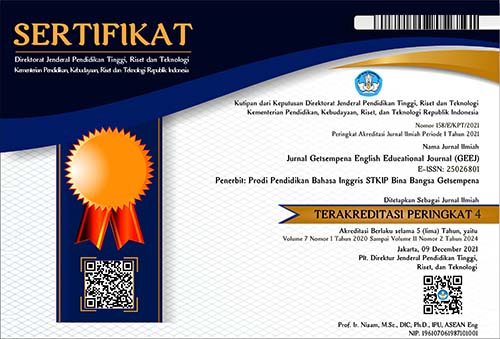THE ROLE OF PARENTS IN LEARNING HERITAGE LANGUAGE: A CASE STUDY OF ACEHNESE FAMILY
Abstract
The old pattern of learning the heritage language has been disturbed because nowadays, some parents do no longer speak their heritage to their children as a mother tongue that consequently may result in a language shift among Acehnese children. The study aims to find out the role of parents in speaking Acehnese as a mother tongue to their children and how speaking Acehnese as a mother tongue for the children impacts on language maintenance and language shift among Acehnese children. This research is a case study that employed qualitative description. The data was collected based on interviews and observation. The informants of the study are six Acehnese people who live in Blang Puntuet village, one of the suburbs in Lhokseumawe city. The informants consist of three female parents and three Acehnese youths aged over 16 years old. The result of the study shows that from three families, one parent is actively speaking Acehnese to their children, one other parent is actively speaking Indonesian to their children, and the rest one is actively speaking Acehnese only to one of her three daughters. Therefore, the study indicates that once the old pattern is disturbed the ability of the children in speaking their heritage language is also disturbed because they are no longer actively speaking Acehnese in home in speech community.
References
Al-Auwal, T. M. R. (2017). Reluctance of Acehnese youth to use Acehnese. Studies in English Language and Education, 4(1), 1. https://doi.org/10.24815/siele.v4i1.7000
Alamsyah, A. (2018). Local Language, Bahasa Indonesia, or Foreign Language? 125, 61–66. https://doi.org/10.2991/icigr-17.2018.15
Amery, R. (2019). Language Is More Than Communication: Why We Should Maintain The Mother Tongue And Promote Linguistic Diversity. Proceedings of EEIC, 2, 1–5.
Anderbeck, K. (2015). Portraits of Indonesian Language Vitality.
Ansori, M. S. (2019). Sosiolingustik dalam kepunahan bahasa. An-Nuha, 6(1 Juli), 51–61.
Arka, I. W. (2015). Language management and minority language maintenance in ( eastern) Indonesia : strategic issues. Language Documentation & Conservation, 7(2013), 74–105.
Aziz, Z. A., & Aulia, N. (2021). Acehnese attitudes towards their heritage language: A qualitative, inter-generational study. The Qualitative Report, 26(8), 0_1-2647.
Aziz, Z. A., Yusuf, Y. Q., & Aulia, N. (2021). Acehnese attitudes towards their heritage language: A qualitative, inter-generational study. Qualitative Report, 26(8), 2631–2647. https://doi.org/10.46743/2160-3715/2021.4830
Baker, C. (2011). Foundations of bilingual education and bilingualism. Multilingual matters.
Canagarajah, A. S. (2008). Language shift and the family: Questions from the Sri Lankan Tamil diaspora 1. Journal of Sociolinguistics, 12(2), 143–176.
Ewing, M. C. (2014). International Journal of Education , Vol. 8 No. 1 December 2014. 8(1).
Idaryani, I., & Fidyati, F. (2021). The Factors that Influence the Language Shift among Parents. Journal of English Language and Education, 6(2), 202–210.
Idaryani, I., & Fidyati, F. (2022a). Language Vitality among Acehnese Parents and Its implication to Language Maintenance: On Perspective of Expanded Graded Intergenerational Disruption Scale (EGIDS). Journal of English Language and Education, 7(1), 170–182.
Idaryani, I., & Fidyati, F. (2022b). The impact of parental language ideology and family language policy on language shift and language maintenance: Bilingual perspective. EduLite: Journal of English Education, Literature and Culture, 7(1), 192–208.
Larsen-Freeman, D., & Long, M. H. (2014). An introduction to second language acquisition research. An Introduction to Second Language Acquisition Research, 1–398. https://doi.org/10.4324/9781315835891
Marinova-Todd, S. H., Marshall, D. B., & Snow, C. E. (2000). Three Misconceptions about Age and L2 Learning. TESOL Quarterly, 34(1), 9. https://doi.org/10.2307/3588095
Miles, M. B., Huberman, A. M., & Saldaña, J. (2014). Qualitative data analysis: A methods sourcebook. 3rd. Thousand Oaks, CA: Sage.
Muhammad, M. (2013). Acehnese-Speaking Parents’ Choice of Language of the Children: Parents’ Attitude Towards Bilingualism in Acehnese-Indonesian Context. Englisia Journal, 1(1), 100–115. https://doi.org/10.22373/ej.v1i1.141
Pulvermüller, F., & Schumann, J. H. (1994). Neurobiological mechanisms of language acquisition. Language Learning, 44(4), 681–734.
Rahman, M. M., Pandian, A., Karim, A., & Shahed, F. H. (2017). Effect of Age in Second Language Acquisition: A Critical Review from the Perspective of Critical Period Hypothesis and Ultimate Attainment. International Journal of English Linguistics, 7(5), 1. https://doi.org/10.5539/ijel.v7n5p1
Singleton, D. (2007). The critical period hypothesis: some problems. Interlingüística, 17, 48–56.
Spolsky, B. (1998). Sociolinguistics (Vol. 1). Oxford university press.
Teuku Alamsyah, Rostina Taib, Azwardi, M. I. (2015). Pemilihan Bahasa Indonesia Sebagai Bahasa Pertama Anak dalam Keluarga Masyarakat Aceh Penutur Bahasa Aceh di Nanggroe Aceh Darussalam. Jurnal Pendidikan Bahasa Melayu, 3, 31.
























